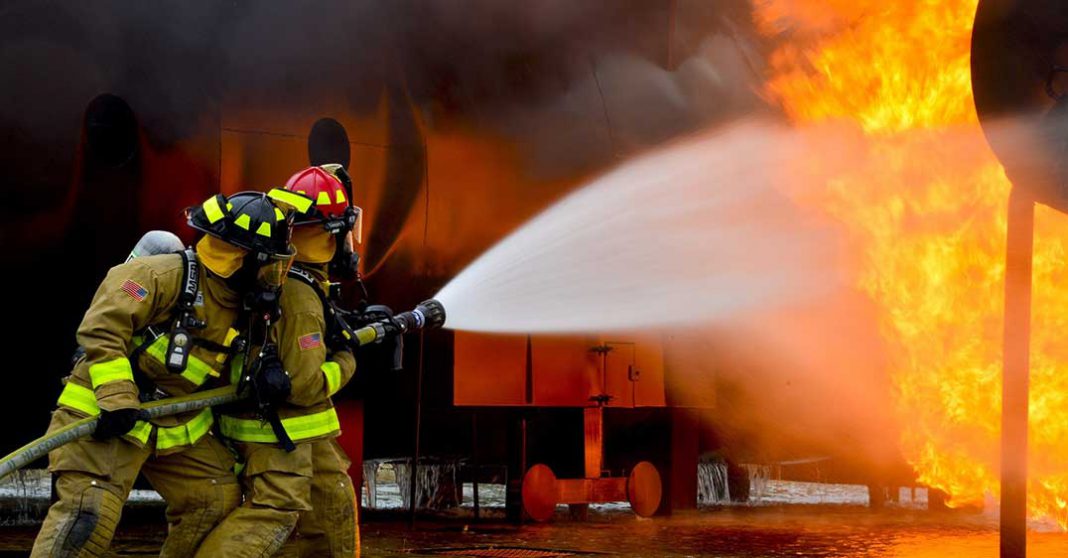by Betty Bardswich
MINDEMOYA—The bi-monthly meeting of the Manitoulin Municipal Association (MMA) on March 21 saw a lengthy discussion regarding fire issues as well as a presentation by Assiginack fire chief and fire coordinator Dwayne Elliott along with Gore Bay fire chief and deputy fire coordinator Mike Addison.
Mr. Elliott spoke to the MMA members about the Manitoulin Mutual Aid plan for fire departments. As the Office of the Fire Marshall and Emergency Management (OFMEM) explains, this plan allows a fire department to request assistance from a neighbouring fire department to participate in a plan approved by the Fire Marshall. That is, a fire department that is at the scene of a fire can ask for mutual aid from another fire department.
Mr. Elliott’s report was to deal with a complaint that was brought to the MMA concerning instances when fire departments responded to a fire, but they had not answered the 911 dispatcher. This practice leads to confusing, costly situations as a second fire department is then dispatched outside of their municipality to the scene only to discover that the first team is already on the scene.
Mr. Elliott stated that mutual aid is for overwhelmed fire departments. “It is not for recurring aid,” he said, “or to offset costs. It is to help your neighbour in a time of need.”
As Mr. Elliott explained, the Province of Ontario Mutual Aid Plan outlines in detail the corrective process to deal with such problems or occurrences. “These issues,” he said, “need to be brought to the fire coordinators’ attention to be correct.”
OFMEM representative Wayne Bennett added that each chief and municipality should review their ability to meet the core services set out in establishing and regulating bylaws. If deficiencies are identified, then the municipality should look at entering into an automatic aid agreement with a neighbouring municipality or First Nations community. An example would be a reduced staffing level in the middle of the day, during the week, because a number of firefighters work outside of their community.
The Mutual Aid Plan that the province has set out is intensive in so far as a process for addressing issues which preclude meeting the minimum conditions for participating in this plan. To start, all participants and non-municipal participants are responsible for notifying the fire coordinator of issues which preclude meeting the minimum conditions for participation in the plan and fire coordinators are to notify the OFMEM when a participant or non-municipal participant fails to maintain the established minimum conditions for participation in the mutual aid plan. The operations manager will then direct the appropriate staff to contact the participants/non-municipal participants of the plan in consultation with the fire coordinator and attempt to rectify the identified issues. The OFMEM may then deliver to the participant or non-municipal participant a written notice with a copy to the fire coordinator directing them to have the deficiencies corrected.
If the participant/non-municipal participant fails to maintain the established minimum conditions for participation in the mutual aid plan, then they will either be removed from the mutual aid plan or will continue to participate in said plan based on the decision of the OFMEM which will be communicated to the fire coordinator, participants and non-municipal participants.
Northeast Town Mayor Al MacNevin spoke of the plan. “If the fire department wasn’t there,” he said, “ours would fight the fire, but it is not mutual aid. If the radio issue is a problem, it can be fixed.”
Mr. Elliott said that there is a problem with communications and that, quite often, clauses can be built into bylaws. “The mutual aid plan does allow for that, a specific purpose,” he said. “Mutual aid is there to help you.”
Central Manitoulin Mayor Richard Stephens spoke of his concerns, saying, “Our firefighters were not sure if they were covered by liability in a different municipality. We wanted to make sure our guys could move without liability.”
Mr. Elliott went on to say, “What is important is where you want them to go and the equipment and people that you can promise to bring. It is a very different thing to say how many when you have volunteer firemen. It is hard to operate without knowing what you are going to get.”
Manitoulin Ontario Provincial Police Staff Sargent Webb voiced his concerns about the plan, saying, “In unorganized areas, for fire support and motor vehicle accidents, there is no mutual aid agreement. Fire service personnel would be put in jeopardy.”
“With the unincorporated, I believe council can give the authority for people to leave,” Mr. Elliott responded. He added that there is an agreement with the Ministry of Transportation (MT0) that fire departments can operate on highways.
Member Dale VanEvery noted that, “in the case of Dawson, the Ministry of Natural Resources responds.”
There was concern voiced by Burpee Mills councillor Art Hayden that the training for firefighters is now “a bit of a moving target” and may not be in compliance with the proposed legislation that is coming up and what would this mean to municipalities.
Mr. Elliott also talked of automatic aid for firefighters. The OFMEM defines this as saying that automatic aid is designed to provide and/or receive assistance from the closest available resource, irrespective of municipal boundaries on a day-to-day basis. This would involve an individual automatic aid agreement with one’s neighbouring municipality and a definition of what the conditions would be and which two departments would respond if there was one automatic agreement for the whole Island. “At the end of the day,” Mr. Elliott said, “it is council’s decision. You need an agreement to go into another municipality. Get a map out and figure out who is going where and when.”
“I guess we have to have a discussion with the fire departments and the municipalities,” Staff Sergeant Webb added.




